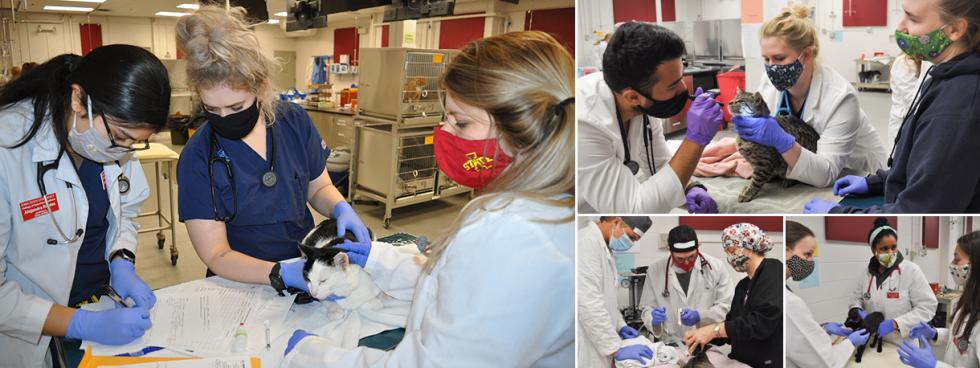
A Better Learning Experience
When Ivan Castillo went into his first live surgery as a veterinary student at Iowa State University he readily admits he was anxious and just a little scared.
“But mostly I was excited,” the second-year veterinary student said. “We had been preparing for surgery for almost two semesters and it was exhilarating to finally be able to apply everything we had learned and successfully perform surgery on a live patient.”
Castillo and the other second-year students’ path into live surgery has been made easier thanks to a mentorship program that pairs them with a third-year student who is enrolled in a surgery elective course.
The second-year students spent four weeks in March applying their surgery and anesthesia skills to neuter male cats. In addition to performing the live animal surgeries during Tuesday afternoon labs, the students come in on Monday and Tuesday evenings to examine the cats before and after surgery.
It’s during these exams that they are paired with a third-year mentor. “The mentors made it a better learning experience when I was performing physical exams,” Castillo said. “I was able to ask more specific questions and their shared knowledge provided me with tips and tricks to better myself as physicians.
“I was better able to interact with my patients also.”
The mentorship program was a perfect fit for third-year student Ruba Elzien. She has a passion for teaching and hopes to educate veterinary students in the future.
“This program was a great opportunity for me to practice my teaching skills while helping other students develop their physical exam skills,” she said. “Mentorship is a key component of student learning and benefits both the mentee and the mentor.”
During the exams, Elzien attempted to give advice and constructive criticism about the use of the second-year students’ skills.
“The main point I try to get across is that while jumping into clinical learning can be intimidating and a lot of hard work, it is an invaluable educational experience if they take it seriously and try to perform all tasks to the best of their ability,” she said.
Another third-year mentor Alex Yoerger said she told second-year students not to be too stressed or nervous.
“It is a lot of work and often involves learning a lot of new skills, but it is one of the best experiences in the first three years of veterinary school,” Yoerger said. “It gives you an excellent opportunity to learn how to do good physical exams, how to administer preventive care, how to perform diagnostic tests, and all aspects of performing a spay and neuter.”
Elzien, Yoerger and the other third-year mentors this year missed out of this program last year when COVID altered the last part of the second-year surgery course.
“Going into the third-year program without having the mentorship experience in our second year meant we were all going into the class blind,” said third-year student Brielle Lien. “The mentorship program would have allowed us to become more confident in our physical examinations of surgical patients and reduced some of the stress.”
Fellow mentor Calli Morris feels the same way but sought out other ways to prepare for her third-year surgical course.
“I was really lucky to find a mentor in the doctors I worked for during COVID last summer who guided me through the flow of intake, physical exams and surgery,” she said.
April 2021
